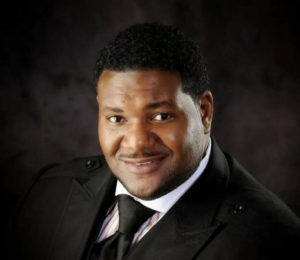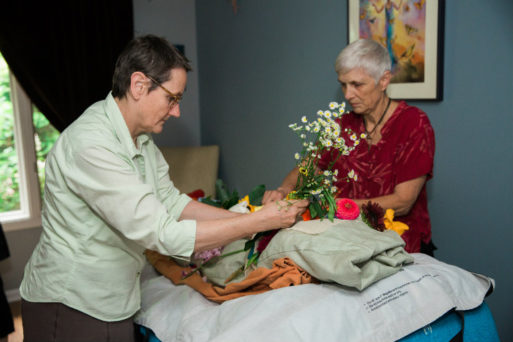Today SevenPonds speaks with Shawnte Hardin, a funeral guide based in Akron, Ohio. Through his company, Celebration of Life Memorial Chapels, he helps families save money throughout the funeral process. From the initial handling of their loved one’s body, to selecting a final resting place, Shawnte advises families about anything related to a home funeral, e.g., a funeral without the help of a traditional funeral home.
Note: This interview has been edited for length and clarity.
Lucas Morgan: Hello Shawnte! Thank you so much for taking the time to speak with me. What exactly would you call yourself? Essentially, what is your job title?
Shawnte Hardin: Some titles that people have given me are Family Funeral Service Advisor and Family Planner, among others. But I would call myself a Funeral Professional or a Disposition Specialist. I’m not a licensed funeral director. Ultimately, my job is to get somebody’s loved one buried or get the body disposed of in a legal fashion.

Shawnte Hardin
Credit: Shawnte Hardin
Lucas: How did you initially become involved with the funeral industry?
Shawnte: When I was a young boy I was very intrigued by the industry. I was fascinated with hearses and limousines, and the whole concept of death. I was really into the mysterious side of it. I always wanted to know, “What happens in the back room?”
My first real experience with the funeral home industry was when I was 12 years old. A funeral director named J.W. Ross, a popular funeral director in Columbus, Ohio, at the time, had worked my cousin’s funeral. When I saw what he was doing, I decided I wanted to do that and wanted to pursue it.
I then called Mr. Ross about two weeks later and asked if I could work for him. He said, “Yes, you can.” Then he talked with my mother and told her to bring me in so I could learn about the business. And I’ve kind of been at it ever since.
Lucas: How did that initial learning process go? Were you essentially an apprentice?
Shawnte: I came in lock, stock and barrel. The first time I assisted him was directly after a person who had died had been autopsied, and the body was completely exposed. It was the first time I saw the inside of a human body. Seeing that at 12 years old was quite eye-opening, if I may say. But I was never bothered by it.
Following this I started to work with him in the embalming room. He had me help out at funerals, and I would help to dress the bodies, handle the caskets, etc. Then, as I became older and got a driver’s license, I started driving the limos and hearses and doing errands for the funeral home, among other things. From there I went on to work at a different funeral home as a hired hand.
Lucas: Why and when did you decide to start your own company, Celebration of Life Memorial Chapels?
Shawnte: When I was about 27 or 28 years old, I started to see what the funeral industry was doing to families. Suffice to say, what they were doing was not right, as far as pricing goes. For instance, they were charging families $8,000 to $9,000 for things that would maybe only cost the funeral home $1,000 to $2,000. I then started to think of ways we could change things in the industry to make it all cost less for families.
About four years ago I joined the Home Funeral Alliance, and I discovered that there were things that families could do for themselves. I then introduced this idea to people in my community. In doing so, many families became aware that they could save money by doing some things on their own. I decided to start doing this full-time, and we began our journey about three and a half to four years ago.
Lucas: What are some ways a home funeral differs from a “traditional” funeral, e.g. one organized by a funeral home?
Shawnte: Families have a few different options. One method is to keep your loved one’s body in your home for the entire time [before burial or cremation]. We usually suggest keeping the body in the home for two to three days and to keep the body on ice. Then family members would come to wash the body, dress the body, do all those things themselves, keeping the body in the home the entire time. They can then lay their loved one in a bed, and family members and friends can come to pray, or do whatever it is they want to as far as remembering their loved one. The funeral itself can happen in the home, a church, a park, anywhere the family wants.
A family can also hire a funeral guide, like myself, to help them with whatever it is they need help with. Some people may want to do all the paperwork themselves, but would prefer to have a funeral director or guide embalm their loved one. A family may not want the body in their home. If so, they can arrange to have the funeral or service at their church, but do so without the help of a funeral home. A family can have a direct consultation with their local church. In Ohio and many other states, the family is allowed to transport their loved one’s body themselves, saving much money in the process. And funeral homes generally do not like that.
Lucas: How much money can people save by having a home funeral vs. a funeral organized by a funeral home?
Shawnte: The average funeral organized by a funeral home without a burial costs around $7,000 to $8,000. A home funeral on the other hand can cost anywhere from $500 to about $3,500, depending on the family’s choices. They may want limousines, programs, a preacher, etc. The average price of a home funeral is roughly $2,500, whereas a “traditional” funeral is around $7,000. And I find that usually with a home funeral, you can get the same services as you would if you went through a funeral home.

Credit: ceolt.org
Lucas: So the price points vary so much because essentially when you go through a funeral home, everything is being done by a third party.
Shawnte: A funeral home is a for-profit business based upon the premise that they will help to bury or cremate a person’s body, and help throughout the entire process. Traditional funeral homes bank on the fact that people do not know the pertinent information themselves.
[Funeral homes] will come to pick up your loved one’s body and store them at the funeral home. This can cost anywhere from $1,200 to $5,000. They will also charge you to do the required paperwork, make the arrangements for the body, etc. Many people think that you have to use a funeral home for these services.
But families can do a lot of this themselves, which is where the home funeral side comes in. You can do the paperwork on your own, specifically you can take it to the doctor and the health department and save a good amount of money by doing so. You can call the casket company yourself and, most of the time, get the casket at a wholesale price, saving lots of money in the process.
A funeral home is basically just a company that you hire to do everything for you. By doing things on their own, families can save a lot of money.
Check back next week as we continue our conversation with Shawnte Hardin, when we further discuss his business and home funerals, and also a court case brought against him by the funeral home industry.

 How Can Families Save Money By Having A Home Funeral?
How Can Families Save Money By Having A Home Funeral?


 “As Tears Go By” by Marianne Faithfull
“As Tears Go By” by Marianne Faithfull
 “The Sea” by John Banville
“The Sea” by John Banville
 Funeral Favors Offer Visitors a Tangible Memento
Funeral Favors Offer Visitors a Tangible Memento















